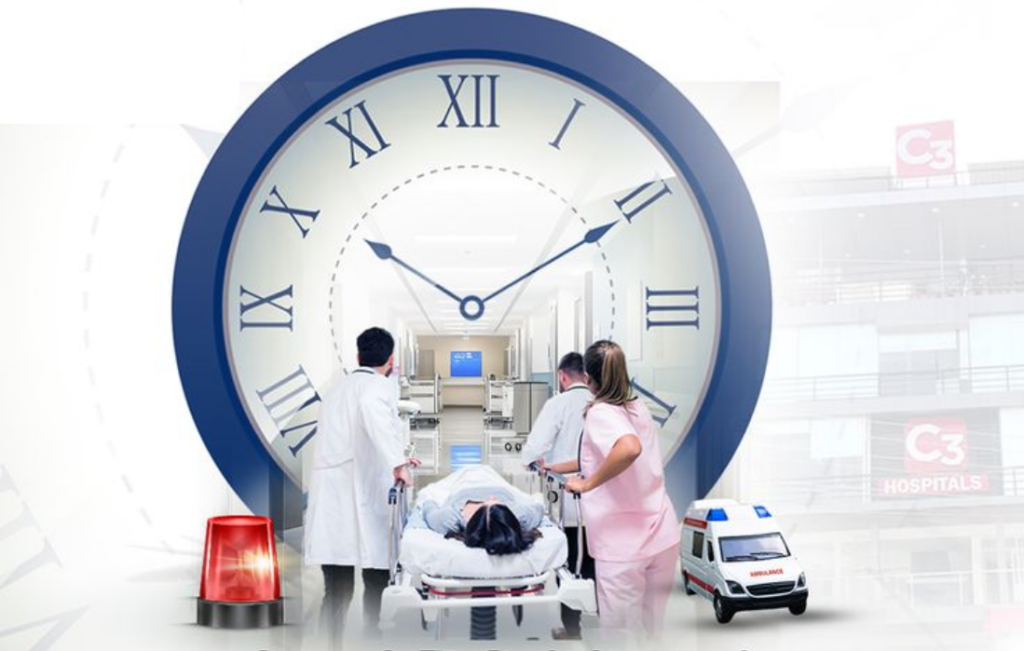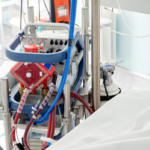
In critical care medicine, the “Golden Hour” is the determining factor for patient outcomes. It is the initial hour after a life-threatening medical crisis, in which prompt medical treatment can be the difference between survival and serious complications. Dr. Amit Kumar Choudhary, who is an expert in Critical Care Medicine, points out the significance of rapid and effective ICU admission in increasing survival rates and minimizing long-term health complications.
Learning about the Golden Hour
Golden Hour is an all-important period of emergency medicine wherein quick evaluation, diagnosis, and intervention may stem deterioration. It is most vital in such cases as:
- Myocardial infarction or heart attack
- Stroke
- Catastrophic trauma or injuries
- Septic shock and sepsis
- Respiratory failure
- Multi-organ dysfunction syndrome (MODS)
Early admission to an Intensive Care Unit (ICU) allows patients to have special monitoring, life-supporting interventions, and around-the-clock care under the observation of critical care experts such as Dr. Amit Kumar Choudhary, an MD in Anesthesia and a DrNB in Critical Care Medicine.
Why Early ICU Admission is Important
1. Enhanced Survival Rates
Studies indicate that patients treated in the ICU within the Golden Hour have a much greater likelihood of survival. Interventions at an early stage like oxygenation, fluid resuscitation, and ventilatory support stabilize the vital functions, avoiding complications that may result in lethal outcomes.
2. Prevention of Organ Damage
Delayed treatment of serious conditions may result in organ failure that is irreversible. For example, in sepsis or severe infection, antibiotics given promptly can suppress the spread of the infection and hence minimize the possibility of multi-organ dysfunction.
3. Effective Trauma and Shock Management
Extreme trauma from injuries or accidents usually results in hypovolemic shock due to blood loss, decreased blood pressure, and oxygenation. Rapid ICU treatment with intravenous fluids, blood transfusions, and monitoring can arrest further worsening and foster healing.
4. Improved Neurological Outcome in Stroke Patients
The first 60 minutes dictate the severity of brain injury in stroke management. Early use of clot-dissolving medications (thrombolytics) in ischemic strokes can reduce brain cell death and enhance long-term functional outcome.
5. Minimization of Long-Term Complications
Early intervention in the ICU minimizes complications like post-intensive care syndrome (PICS), including cognitive dysfunction, physical debilitation, and psychological disturbances. Critical care specialists in Pune, such as Dr. Amit Kumar Choudhary, provide complete post-ICU care to improve recovery.
The Role of Critical Care Specialists
An ICU operates effectively with the help of a team of experienced professionals, such as intensivists, anesthesiologists, nurses, and respiratory therapists. Dr. Amit Kumar Choudhary, an MD in Anesthesia and a DrNB in Critical Care Medicine, is responsible for taking care of critically ill patients by:
Evaluating and diagnosing life-threatening illnesses promptly
- Providing proper life-support interventions
- Monitoring vital parameters and modifying treatment accordingly
- Providing ventilatory support and hemodynamic stabilization
- Ensuring pain relief and sedation when required
- ICU Facilities in Pune
With advancements in medical technology, ICUs in Pune are equipped with state-of-the-art ventilators, advanced monitoring systems, and specialized emergency protocols. These facilities ensure that critical patients receive round-the-clock care, rapid interventions, and multidisciplinary management to improve survival rates and quality of life.
The Need for Awareness and Preparedness
Lives are saved in large numbers if individuals become aware of early warning symptoms of medical emergencies and obtain ICU treatment without hesitation. Never overlook symptoms including chest pain, breathing problems, loss of consciousness, heavy bleeding, or confusion. Families must be equipped with information on emergency contact numbers, the availability of ICU facilities nearby, and the need to act quickly.
Summary
The Golden Hour of Critical Care is a precious time during which prompt medical treatment can greatly influence the survival and recovery of a patient. Proper ICU admission under the able guidance of experienced experts such as Dr. Amit Kumar Choudhary ensures that patients are provided with life-saving interventions, preventing complications and improving long-term results. Increased awareness regarding the value of prompt action in times of medical emergencies can save so many lives. In case of a critical emergency, recall—speedy action works wonders.




